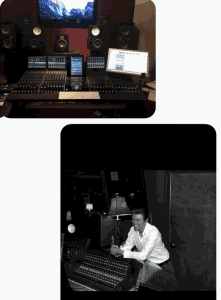Bassy Bob Brockmann on Bowie (Interview)
Grammy Award-winning mixer and producer “Bassy” Bob Brockmann was in Auckland recently and stopped by The 13th Floor for an interview with Marty Duda. Mr Brockmann is known for his work with the likes of The Fugees, Notorious BIG, Christina Aguilera, Mary J Blige and Faith Hill. As it turns out, Bassy Bob, who is based in New York City, spends quite a bit of time working at a studio called The Magic Shop, the very same studio where David Bowie recorded Blackstar. The two men’s paths crossed a few times last year and so, upon learning of the death of Mr Bo

wie, “Bassy” Bob Brockmann offers up his thoughts and insights into the work of David Bowie.
Click here to listen to the interview with Bassy Bob Brockmann:
Or, read a transcription of the interview here:
Bassy Bob Brockmann on David Bowie
MD: One artist who is very much on everybody’s minds these days is David Bowie, since he just passed away a few days ago, and he’s the classic example of the guy who is always putting himself out there and making himself do things that…
BB: Putting himself in vulnerable positions…
MD: Exactly. And you were mentioning to me before we started that you knew some of the musicians that played on Blackstar.
BB: Right
MD: And that’s part of that New York City scene that you’re somewhat involved with. Since everybody wants to talk about David Bowie, we can shed a little insight on some of those people.
BB: Well you know I spent a lot of time looking at a lot of documentaries right after Blackstar came out because he had just finished, I think, doing the principle recording on that and, the studio that he had done most of his work at with Tony (Visconti), The Magic Shop in Soho, was also my favourite studio. So I had spent most of August in there working on this girl Kristin Walker, this 19 year old singer that I’m developing from Barbados. You know, he would periodically pop in and out of the studio to pick up things that he needed and he was very secretive about those recordings. I think he was very secretive about his illness as well, I don’t think he told very many people. Certainly I found the record to be a very dark record. When I was listening to it I had no idea that it was a requiem at the time…maybe he didn’t. I understand that he got his final diagnoses two months ago so he wouldn’t have known that the liver cancer was fatal at the time he was recording it, but maybe somewhere deep in his subconscious maybe he had a feeling for that.
Yeah, so this engineer named Eric Gorman who I basically trained at my studio, New Media, that I had for ten years on lower Broadway, right out of college…I sort of taught him the trade early on. He’s now blossomed into a fantastic producer and mixer and he’s the chief engineer at Magic Shop. Also, Steve Rosenthal, the owner of the studio, is a long-time colleague and friend of mine. We’ve known each other for about 25 years so…
I think I would have paid closer attention to what Bowie was doing at the studio if I didn’t think it was his last record. Not that I didn’t take it seriously. I was looking at this interview he did with the BBC in 2000 and he was talking about straightening up his life and getting rid of drugs and alcohol and he said something very prophetic about…that he thought in the near future that DJs would become very, very important to culture and that audience members would become as much of the show as the actual performer…as the DJ. And now when I think about the sharing culture and the selfie culture and the way that people experience…particularly millennials…how they experience concerts, it’s incredibly visionary of him to have sussed that out in the year 2000, well before the internet was even relevant, and certainly mobile technology hadn’t really emerged until 2005, 2006. So he was very much philosophically a futurist. I think he had a very very keen idea of where culture was going. It was certainly very sad that I found out his passing while I was away from New York…here in New Zealand.
MD: And what are we going to do without him? Who’s going to tell us what’s going to happen next?
BB: Not only that, what are we going to do without him as an artist? He just really was such a social agent of change. I’ve been reading all of the long responses in the New York Times, particularly in the LGBT community…you know, a lot of people who would have otherwise killed themselves because they had such a difficult time growing up, they were like, “Well I don’t need to kill myself, I can be rock and roll”. They were very much influenced and you know… Even though apparently David Bowie was not even gay, you know…
MD: It doesn’t matter anymore.
BB: It doesn’t matter. He had that cultural effect, you know. Of course he had to go back ten years later and recuse what he said in the media. I think that he was fearless in a way. I mean, for somebody to step out and declare themselves as gay in the early seventies was…we think about people weren’t even doing that two or three years ago. He was very, very much ahead of his time, by decades.
The full interview with Bassy Bob Brockmann will be posted soon.